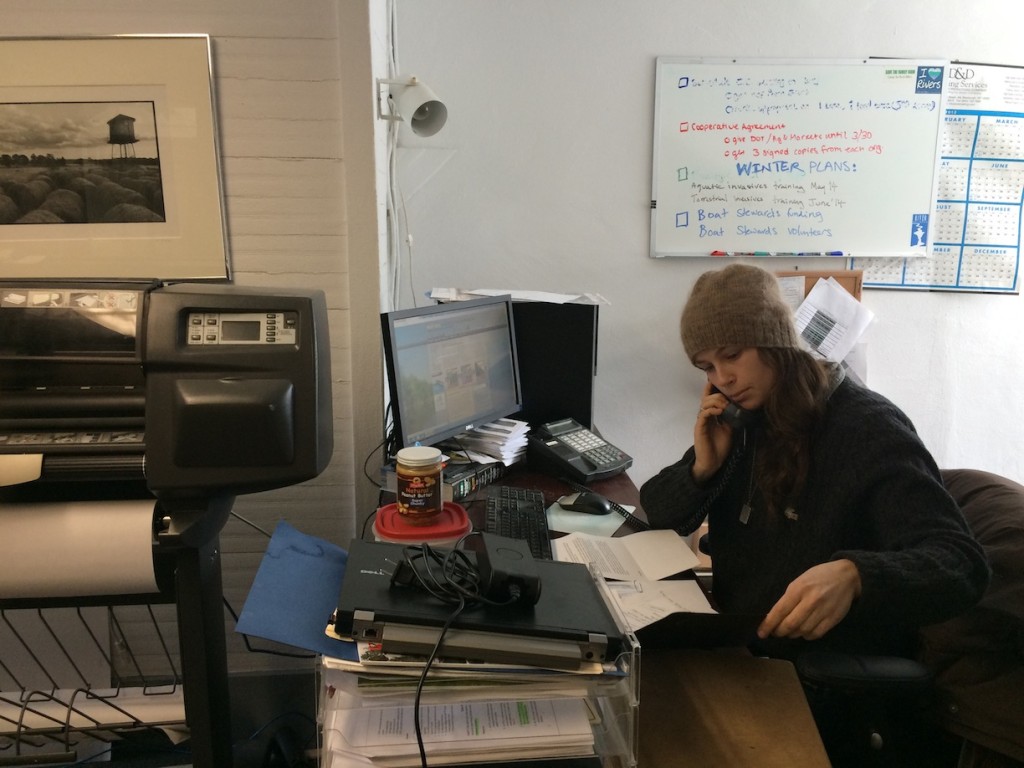
© Erik Johanson/@halcott718 Molly Marquand at her office at CRISP in the Catskills Center
“My muse is always nature.” Molly J Marquand, Catskills transplant and fellow native Brit, photographer, writer, naturalist, and wild flower gardener dishes the dirt to Upstate Dispatch in our new series Catskills Conversations.
How long have you lived in the Catskills? About two and a half years, I moved from New York City where my fiancé and I, Martin, lived for three years. I was born in England and moved to the Hudson Valley just before high school. I did go back to England to get my Masters Degree, in Taxonomy and Conservation of Plant Diversity (Botany) a joint programme with Kew Botanical Gardens and The University of Reading. But my undergraduate degree, which was in Ecology, I did at Bates in Maine.
What made you move here? I’d always had my eye on it, because I knew that I always needed space. We had this dream of having a farm and having wide open tracts of land. At the same time, I wanted to be close to my mother who lives in the Hudson Valley. [My fiancé and I] were both attracted to landscapes like the Rockies and Montana and places like that, but knowing that we were never going that far away because Martin’s family live in New York City.
What do you do for work? Hm. What don’t I do? I try to do as much as possible. My passion is with plants. I have my Masters Degree in Botany, so I grow flowers here and arrange flowers for weddings and focus on native plants and wild, foraged flowers because that’s what I find most exciting and unusual.
I’m the co-founder of the Catskill Native Plants Society. We’re not yet a 501(3) c, but we do trips, workshops and lectures: generally advancing the local understanding of our native plants here in the Catskills. It’s not a paying gig, but it’s a big part of what I do.
A lot of work up here is unpaid isn’t it? Yes, well that’s another one of the attractions. You can live here quite cheaply and have an amazing quality of life in terms of access to the city, airports, good food and space. Space is incredibly important. It’s getting scarcer and scarcer, and here you can still have it.
So what else do you do for work? I’m also a freelance writer. I write mostly about things to do with nature, the garden and more scientific writing having to do with botany and plant conservation. Also I’ve done some food writing for Edible Hudson Valley.
I’ve also just finished up writing a book with Wilder Quarterly, for whom I was horticultural editor for about three years. It’s a remake of the Whole Earth Catalogue that was written in the sixties, which is basically a guide to homesteading.
What do you do for the Catskills Center? I co-ordinate their invasive species programme (CRISP). It’s a full-time position.
You’re never busier than when you move to the country. I know!
Is there such a thing as a day off in country life? I think there can be. I mean part of the reason why we moved here is to take advantage of all the activities that there are to do. I’m not personally somebody who can go sun tanning or sitting around. Especially having the space that we have here, it keeps presenting all these things to do. There are so many creative people around us in the community. I just started up this partnership with my neighbour who is a young farmer and we’ve just decided to start growing peonies on a large scale. He has a tractor and I like flowers…
You do have to force yourself to have down time. If I don’t take my camera somewhere, I feel like I’m missing something. Yes, I agree and I am cognizant of the fact that the need or craving to be busy is an affliction of who we are in the modern day. I try to be aware of that and take the time. My friend was saying that he can now see the Caddis flies in his pond and was thinking about how he should stop and look at them. I try and identify that new bird that just starting singing, that sort of thing.
I’m asking this question of everybody lately: what is work? I think there are two distinct kinds of work. I mean, when I think of work, I’m thinking that you’re making some sort of sacrifice or payment in terms of your time, sweat, maybe your peace of mind, or your freedom. You’re paying out with some kind of currency when you’re working. Certainly what we are trying to achieve when coming to the country is doing the kind of work that is more integrated with pleasure, the kinds of things that are sustaining and make us happy, not the rat race, where you’re just kind of in it and you don’t know why.
Find Molly at her Website and on Instagram.